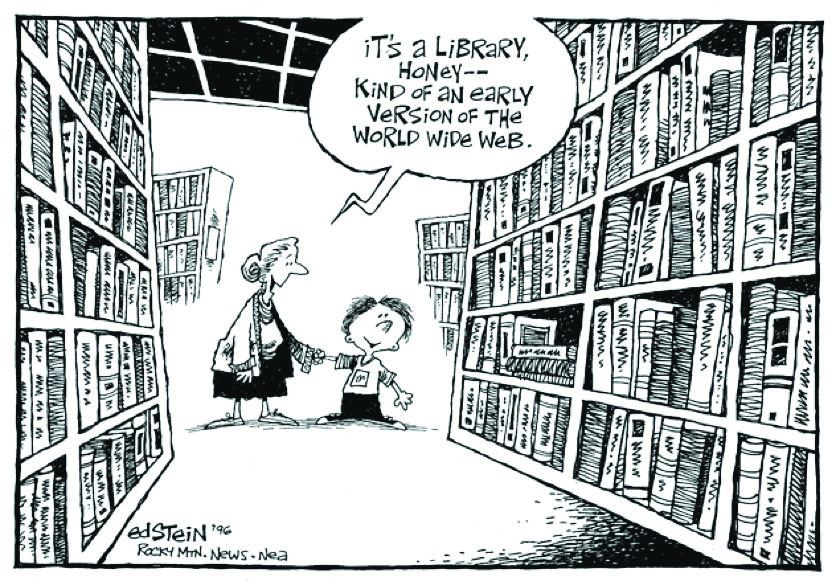Libraries become more necessary in face of modern, digitized world
When the Great Library of Alexandria burned down in 48 B.C.E., humanity lost literal centuries of knowledge. So much was stored in that library: technological advancements, architectural and agricultural techniques, scholarly writings, historical records from over the centuries and more. That level of information is almost unfathomable to comprehend. In today’s world, we have our own Library of Alexandria: the internet.
We’ve come a long way from fragile scrolls and stone tablets; the majority of information is stored online, our knowledge digitized and often a mere Google search away. But does this change our need for libraries? Does this new way of obtaining stories and knowledge render the concept of a physical library obsolete?
To that, I say a firm, resounding no. Although libraries may not seem relevant in this world of digitized knowledge and easily accessible information, they are more necessary than ever.
The library is not obsolete. In fact, as a community resource, it is quite the opposite. As well as being a convenient way to find books, libraries provide essential aid to their communities. Along with being a free source of shelter during bad weather and the winter months, libraries also provide programming, employment information and community references, among other resources.
Libraries are more than just mere buildings in which to store books; they are centers of learning and innovation. They provide a place to gather and meet members of the community, especially for children with limited access to programming and stories. When I think about this valuable space disappearing from the lives of children who need it, I remember my own childhood.
As I was growing up, my local public library was essential to my personal growth. Without the resources provided by my local library, my love for reading and writing would not have developed to the extent that it did. The library was a haven for my curiosity about literature and the community around me, and I will forever be grateful. And so I feel a strong compulsion to defend this institution, not only for my past self, but for others who have a similar need for a space in which to discover their interests. For people who love to read but don’t have the funds to buy books, libraries are vital.
If we keep looking at public resources in terms of the profit they make, so many essential community resources will vanish. Public libraries host speakers and allow a free space for community events. They can be a place for town hall meetings, art exhibitions and poetry readings. Libraries are cultural hubs, and serve a huge purpose in community-building. Unfortunately, not everyone recognizes this, especially policy-makers who choose where to divert public funding. The future of the library is in danger. Federal library funding is already at risk, and online retailers’ ever-growing dominance over the book market means that readers are choosing other sources from which to obtain their media.
Therefore, if we want to save the modern library, it’s our responsibility to utilize its resources. Since using the library is free, it relies on the community to support library activities, not monetarily, but through participation. It is integral not only for the library, but for those who depend on the library for their daily shelter and activities.
So why choose going to the library over simply obtaining your resources from Amazon or another e-reading company like Script? Well, there’s one obvious reason: library books are completely free to use. Many libraries also have free e-books you can check out online. And if a library doesn’t have a resource, all you have to do is fill out a form and ask. Librarians are highly trained in multiple areas, and a huge part of their job is to aid in the recovery of information.
This article may read like a mere informational essay on the benefits of public libraries. But it is critical to pay attention to our public resources, as well as not take them for granted. Unfortunately, free public services such as these are something we must fight for. Libraries are essential to knowledge accessibility, especially when it is difficult to trust information from various online sources. So many social opportunities and activities in the United States are hidden behind a paywall, a fee charged just to exist in a space. In an increasingly money-focused society, libraries are a welcome beacon of hope for free knowledge and social interaction.






